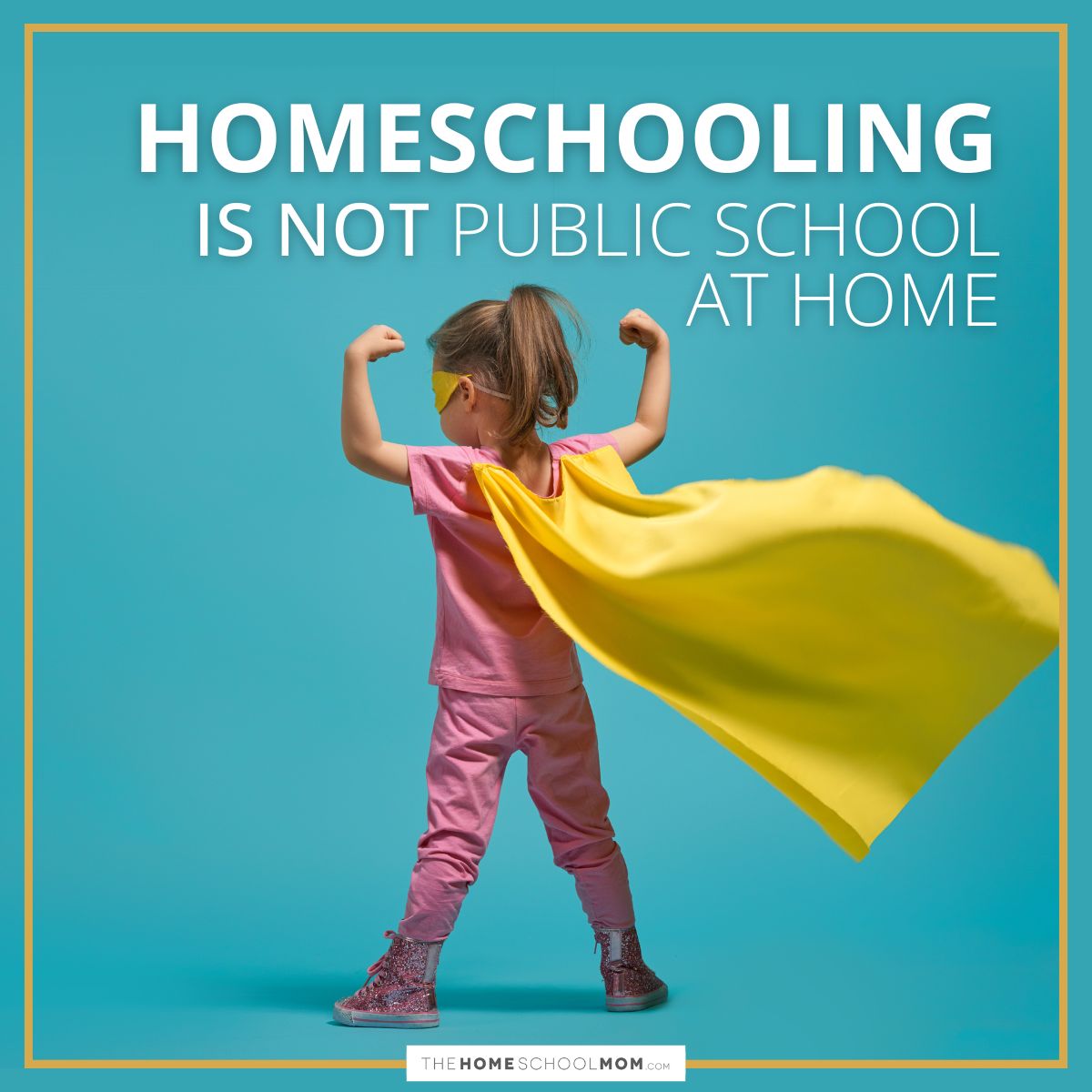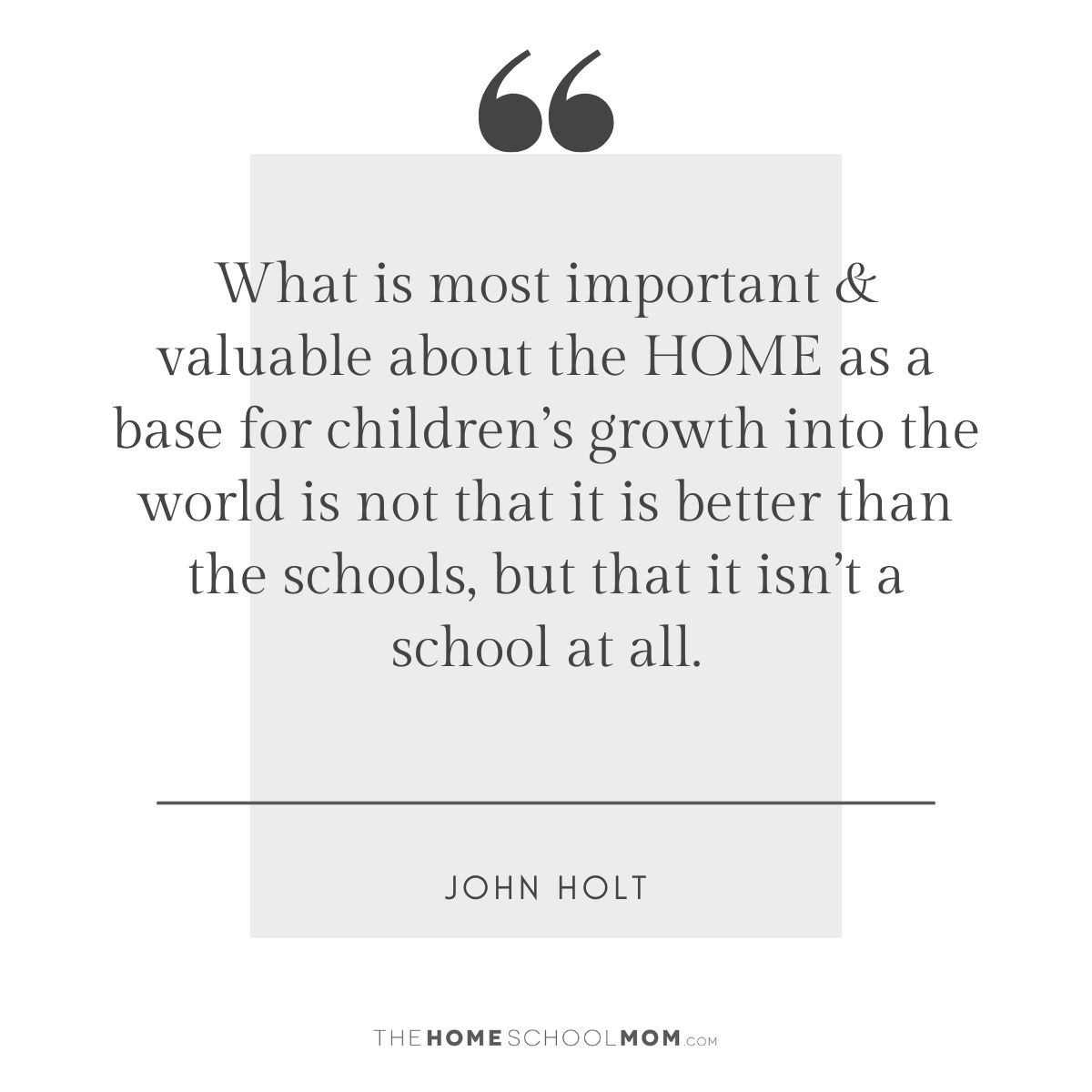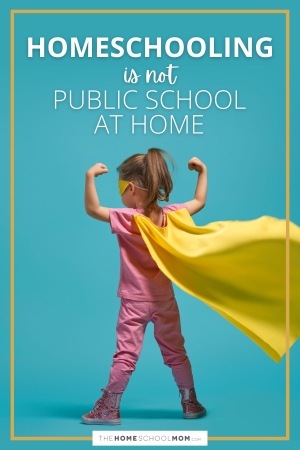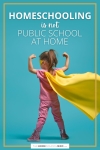She got me thinking. My friend, who, for the first time, was questioning some of the values, methods, and efficacy of public school and began investigating the idea of home education for her family. By asking me questions about this whole "homeschooling thing" that we do, she brought to my attention something with which we homeschoolers ourselves struggle.

My friend didn't even realize it, but with her questions about what we did and why we did it, she displayed what is a very common misconception about homeschooling: that homeschooling is some kind of a microcosm of the public school classroom, transported to the home environment. As I thought about it, I realized that many of us homeschoolers struggle against the very same misconception.
It's not just those who do not homeschool that carry around the assumption that home educators must somehow replicate the public school classroom to effectively teach their children.
Many of us homeschooling parents, particularly those who grew up in the public schools, feel the same pressure, whether we realize it or not. It's a pressure that keeps many families from even investigating home education as an option - "How could I possibly teach my children the way 5 or 6 different teachers of different subjects could teach them?"
The good news is, you don't have to.
Home education is not public school at home. It is a completely different way of thinking about education, and a completely different way of approaching education.
It is teaching tailored specifically to individual children rather than according to a standardized set of guidelines or curriculum for the masses. And because of this individualization, home education is effective by virtue of the fact that it does not have to look like the public school classroom.
How is it different? Here are just a few of the ways:
- Flexible schedules. Standardized "periods" of learning (45 minutes, 90 minutes, etc.) based on organized schedules for managing large numbers of students can be exchanged for flexible periods of learning based on the individual student's needs. For example, if Johnny is ADHD and cannot sit for long periods of time, reading is done in 3-minute increments, with activity-based breaks in between. Subjects that may be laborious, such as grammar, may be interspersed with more kinesthetic subjects such as Science. If the student is a math whiz, math may only take 15 minutes, whereas history might take 45 minutes.
- Relaxed environment. Sitting at desks can be exchanged for lying on the floor, working on a picnic blanket outside, saying math facts while jumping on the trampoline, or writing on a lap desk in bed. Students who have trouble staying still have the freedom to move as they need to, and those who enjoy a more relaxed learning environment can do their work in whatever setting works for them.
- Different perspectives. Educational milestones do not have to follow the prescribed public school standards of learning for each level. Education is seen as a long-term project, with the understanding that students progress differently in different subjects and at different rates. A child may be ahead in one subject according to "end of grade" public school requirements, but be behind those guidelines in another subject; there is more focus on holistic educational attainment over the long haul than on episodic progress according to a particular path of progression.
- Collaborative learning. Learning tends to be more collaborative rather than didactic. In other words, rather than students "learning from an expert", children and parents participate together in investigating new information and ideas. Interaction, questioning, analyzing and debate usually predominate over simply listening or taking notes; critical thinking is often stressed over memorization or fact recall.
- Broader focus. Non-academic skills are often taught alongside academic ones; the ability to repair household items, cook meals, manage money and demonstrate basic entrepreneurship is often deemed just as important as English, math, history, and science. Academic skills can be demonstrated practically throughout household life to enhance practical skill application.
- Interest-led learning. Rigid guidelines for the scope and sequence of learning can be exchanged for flexibility and spontaneity in order to make learning fun. If a certain topic in science sparks a particular interest, rather than continuing on in order to "get the book finished" or keep a particular pace, students can do a unit study on that particular area or go into depth doing additional research on their subject of interest.
- Varied learning environments. A fairly standard classroom setting, with an individual teacher, can be exchanged for a variety of different learning environments. Co-ops, cooperative learning among homeschooling families, distance education programs via computer, internet programs and iPad applications, library education classes, local community college courses, apprenticeships and mentoring programs are all common options for homeschooled students - in addition to working with their own parents.
- Individualization. One curriculum for each subject, to which each student needs to "fit", can be exchanged for multiple resources according to each student's individual needs and learning styles. In contrast to every student in a class working on the same materials, different children in the same family can work through completely different curricula for any given subject to ensure that each one uses materials that best meet his/her specific needs.
And those are just a few of the differences. Homeschool parents, you don't have to make your homeschool into a public school classroom. To do so would be to miss out on the wonderful benefits of home education…the individualization, the flexibility, the holistic approach, the collaborative learning, the focus on developing personhood.
It is precisely the fact that homeschooling is different from public school that makes it a unique and wonderful option for many families. Public school is there for those who want it. Homeschoolers, make your home education what you want it to be-as unique and special as your own family.





 Rebecca Capuano holds a Master of Social Work degree from East Carolina University and is the stay-at-home mom of three children (one of whom is in heaven). She also makes attempts at being a homeschooler, writer, photographer, scrapbooker, and truth-seeker. She has worked in a variety of capacities (including group homes, day treatment centers, and public schools) with at-risk children and staff, including developing a therapeutic and educational day treatment center for delinquent youth in Wilmington, North Carolina. She currently resides in Virginia. Rebecca believes that family is created by God as the most fundamental institution in society, and she is dedicated to helping families nurture their children to become responsible persons of character and integrity.
Rebecca Capuano holds a Master of Social Work degree from East Carolina University and is the stay-at-home mom of three children (one of whom is in heaven). She also makes attempts at being a homeschooler, writer, photographer, scrapbooker, and truth-seeker. She has worked in a variety of capacities (including group homes, day treatment centers, and public schools) with at-risk children and staff, including developing a therapeutic and educational day treatment center for delinquent youth in Wilmington, North Carolina. She currently resides in Virginia. Rebecca believes that family is created by God as the most fundamental institution in society, and she is dedicated to helping families nurture their children to become responsible persons of character and integrity.
I trying to homeschool my kids but everything is public school online I not looking for on line public school
Homeschoolers often help their children learn at home without using any online curriculum or only using an online resource for one or two subjects. You can look at curriculum reviews here to get an idea of resources that are available. Some parents don't use curriculum persay but focus on a particular approach to homeschooling.
Online schooling may be public, private, or homeschooling, depending on your state and on the program itself.
Check out our local and state homeschool resources to find the laws and resources for your area. A state or local homeschool organization can help you distinguish true homeschooling resources from public school at home.
I am a stay at home mom of 3. I need help. I don't know where to start.
Hi Donna,
We have lots of information about getting started homeschooling here:
https://www.thehomeschoolmom.com/homeschool-help/getting-started-homeschooling/
saying that it is a misconception is euphemistic, don't you think? it is so rampant that I call it prejudice.
Parents who actually desire to teach theor children to develop their own sense of personal responsibility when it comes to learning, are almost always treated second- or third- class, by the greater majority of the american population.
however, the difference between "unschooling" vs. "public schooling" (the latter, either at home or in an institution) is, in all actuality, the difference between teaching your child to drive a car, or to teach them that they are fine to just go along for the ride. that's why most people are satisfied with saying "after all, don't they get to the same destination!?"
We struggle with this mostly because we know that we may not (or not be able) to home school forever. There is always that need to keep up and and make sure they never fall behind in any area. We are trying a more traditional curriculum this year (Calvert) to meet the basic traditional school requirements and I actually worry that it may be too slow to allow us to stay 2 grade levels ahead as we have done so far. Its a twisted conundrum.
What I find hard is the pressure from my school authorities. They had no idea what homeschooling is and have no interest in finding out but want my kids to be "perfect". They put me at a high standard then their own teachers. They expect me to do as school does. Because of this I struggle everyday with how to balance all of this. Thanks for the great article. 🙂
I have that struggle, too. My son didn't like his history curriculum that he did only 4wks worth and plenty of daily newpaper reading. Also he had a hard time with the math currculum that I gave him ACE paces which he finished. I wonder if he is learning with his"unschooling". I'm still question myself if he is learning. Thank for the the information.
My husband and I have often struggled with the same concept of feeling like we needed to recreate public school at home. It takes some work to think outside of the box when all you have known was public school. Great tips - thanks!